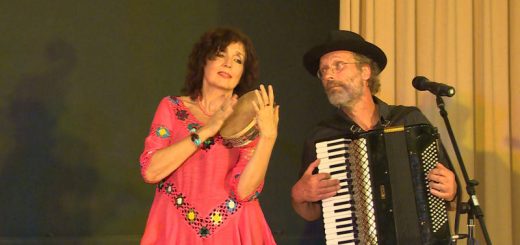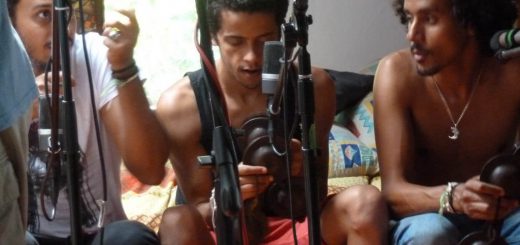Rosch ha-schana
Heute, am 3. Oktober, beginnt das neue jüdische Jahr 5777. Das Neujahrsfest Rosch ha-schana (Jiddisch: rosheshone) ist keine rauschende Party wie unser Silvester, vielmehr läutet es die „zehn Tage der Buße“ ein, die in dem Versöhnungstag Jom Kippur kulminieren. Es ist eine Zeit der Selbstbesinnung, der Reflexion der Taten und Untaten des letzten Jahres, der Vorsätze für das neue Jahr, der Versöhnung und des Verzeihens, der Aufarbeitung und Beilegung von Streitigkeiten und des Zugehens aufeinander.
Dazu gehört auch die Zeremonie des Taschlich: man steckt die Sünden des vergangenen Jahres in Form von Brotkrumen in die Tasche und streut sie symbolisch in ein fließendes Gewässer.
Mit dem Klick auf dieses Video erkläre ich mich damit einverstanden, dass eine Verbindung zu Youtube (Google) hergestellt wird und dass Cookies gesetzt werden.
Tangoyim spielt das traditionelle „Fun Tashlikh“
Über einen Newsletter erreichte mich folgender Text aus Jerusalem von Rabbi Lior Engelman zum Thema Verzeihen, eine Erklärung in einfachen Worten, warum es so schwierig – und doch so wichtig – ist, Konflikte beizulegen:
Forgiveness
(A free translation from the work of Rabbi Lior Engelman)
Forgiveness: Hard to Ask
It’s hard to ask for forgiveness, it’s hard to admit a mistake. It’s even harder when we are forced to admit that sometimes the evil that we did wasn’t even done by accident. It’s hard to admit that we are not wholly perfect–it goes against the conscientious image that we construct for ourselves. It’s hard to ask forgiveness from a person whom we have hurt because the request for forgiveness may be taken as assuming complete responsibility for what happened, even though that might not be the case. Also, the person who asks for forgiveness is often considered to be the „loser“ in the battle, while the person who is asked to forgive is taken to be the „victor.“
It’s hard to ask forgiveness mainly because of the trait of pride, which makes it very difficult for us to see our faults and makes it very easy for us to identify weaknesses in others. It’s especially difficult to ask forgiveness from someone whose standing is inferior to our own, and so we find it especially difficult to ask forgiveness from our children, from our students, and from any other person who is beholden to us. It’s hard to ask forgiveness because it’s difficult to acknowledge that we are only human beings: limited, mistaken, at times willfully devious—mortals and not God.
Precisely because it is so hard to ask forgiveness this step is so much needed. Asking forgiveness is equivalent to many hours of studying ethics and to many years of working on one’s character traits. Asking forgiveness puts a person in their true aspect as a human being–as lacking, as someone with weaknesses, as someone who is not perfect. It’s practically impossible to enter the High Holiday period without sincerely asking forgiveness from a person whom you hurt. It’s impossible to stand before the Creator of the Universe as if you did not have any deficiencies. In order to stand before God correctly, bent over and with modesty, we need the courage to admit wrongdoing and ask someone for forgiveness.
Forgiveness: Hard to Grant
It’s hard to forgive. Very hard. It’s hard because it’s very tempting to nurse a grudge forever, to forever give the person who hurt me the feeling that he remains in a position of obligation toward me. It’s hard to forgive because his hurting me immediately puts me above him—he is the bad one and I am the good one; I am the pious one and he is the evil one. It’s hard to forgive because of my pride, which thinks that there is no price for my wounded honor. Because of my own exaggerated self-importance, I am convinced that nothing can atone for what was done to me.
It’s hard to forgive because this means acknowledging that the person who hurt me is now acting with great bravery by asking for forgiveness. It’s hard to forgive because it’s comfortable to be the wounded and the unfortunate one. It’s almost addictive to be the discriminated against, the one whom the world crushes, because the unfortunate one can bask in self pity and not demand anything of himself. To forgive means to move forward and not bury oneself in the past.
Precisely because it is so hard to forgive we must forgive, because „a calm heart gives bodily health; jealousy is rot to the bones“ (Proverbs 14.30). And as the commentators explain there, a person whose heart calmly forgives will live a long life, while a person who is filled with a jealous desire for vengeance will see his bones rot. The obsessive quest for the ruin of the other turns one’s own life into a rot that does not heal.
Our ability to forgive gives us hope during the Days of Awe that God too will be forgiving and pardon us our sins. Shana Tova.
Copyright 2016, Teddy Weinberger



